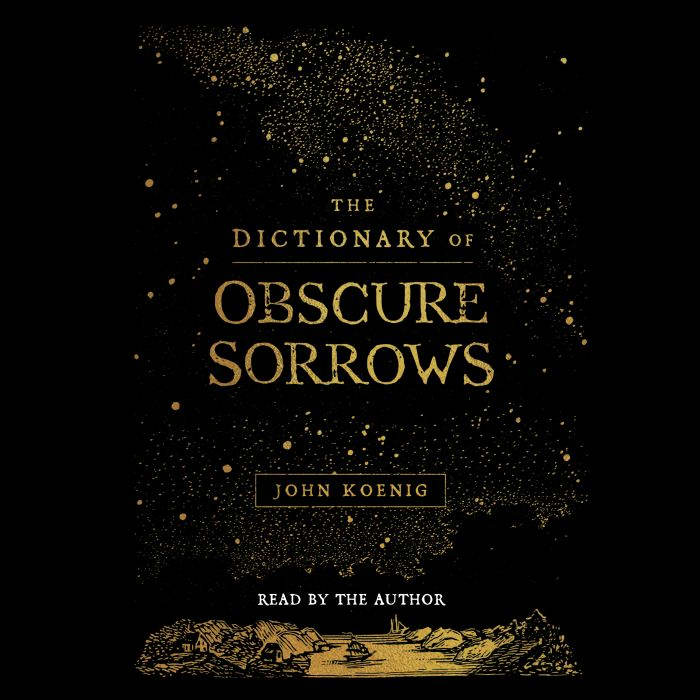
How to talk about life, work, and money with the help of The Dictionary of Obscure Sorrows.
[SPONSORED POST]
A comfortable space—regardless of your background or experience with financial topics—where we can talk openly about money and its role in our lives, communities, and society.
Life with Money
Some of what we’ve written in our Life with Money column has touched on religious and spiritual traditions and their approach to money. While I don’t have any organized religious practice, a walk in the woods is spiritual for me in the sense of lifting and filling my soul.
To that end, I was fortunate enough to go on a five-day backpacking trip on the Tahoe Rim Trail (TRT) this summer. (I wrote about it for the Piedmont Exedra in August). Unfortunately, my wife Julie developed elevation sickness and had to leave the trail before completing the 50+ mile hike. She convinced me that I should continue, but I definitely felt lonely and sad without her. (We completed a different section of the TRT together in 2021.)
In this slightly melancholy state of mind, I turned at the end of each day’s hike to a short (and light, since the pack already weighed 35 pounds) book called The Dictionary of Obscure Sorrows. I heard the author, John Koenig, interviewed on NPR, and knew I needed to pick it up for moments like these. If you’re looking for an easy read that might make you cry and could also inspire laughter, but will definitely make you think about life, I highly recommend it.
As Koenig writes in the introduction, “This is not a book about sadness – at least, not in the modern sense of the word. The word sadness originally meant fullness, from the same Latin root … that also gave us sated and satisfaction … When we speak of sadness these days, most of the time what we really mean is despair, which is literally defined as the absence of hope. But true sadness is actually the opposite, an exuberant upwelling that reminds you how fleeting and mysterious and open-ended life can be” (page xii).
With that mindset, I devoured the definitions, all of which Koenig invented. Some have clear resonance with our work at Park Piedmont Advisors, and some are more loosely connected — and still relevant, such as:
Hubilance (page 115) – the quiet poignance of your own responsibility for someone, with a mix of pride and fear and love and responsibility – feeling a baby fall asleep on your chest, or driving at night surrounded by loved ones fast asleep, who trust you implicitly with their lives—a responsibility that wasn’t talked about or assigned to you, it was assumed to be yours without question. (From hub, the central part of the wheel that bears the weight, + jubilance.)
I think any parent, spouse, or pet owner for that matter, will share this sentiment.
Thrapt (page 116) – awed at the impact someone has had on your life, feeling intimidated by how profoundly they helped shape your identity, having served as a ghostwriter of a work that nevertheless only appears under your name. (From thrapped, drawn tight, as with nautical ropes, + rapt, carried away with emotion.)
This one made me think of Victor, my dad and co-founder of Park Piedmont Advisors, and his enormous influence on my life and on PPA.
Sonder (page 123) – the awareness that everyone has a story … You are the main character. The protagonist. The start at the center of your unfolding story. You’re surrounded by your supporting cast: friends and family hanging in your immediate orbit. Scattered a little further out, a network of acquaintances who drift in and out of contact over the years. But there in the background, faint and out of focus, are the extras. The random passersby. Each living a life as vivid and complex as your own… When your life moves on to the next scene, there’s flickers in place, wrapped in a cloud of backstory and inside jokes and characters strung together with countless other stories you’ll never be able to see. That you’ll never know exist. In which you might appear only once. As an extra … in the background. As a blur of traffic passing on the highway. As a lighted window at dusk. (From sonder, to plumb the depths.)

Koenig has said that this one is the best known of any of his definitions, and he has heard it used by others who have not read the book.
Other definitions are relevant to work, both for our clients pursuing their life goals and for our team at Park Piedmont Advisors, offering help in that process:
Elosy (page 215) – the fear of major life changes, even ones you’ve been anticipating for years; the dread of leaving behind the bright and ordinary world you know, stepping out into that liminal space before the next stage of life begins, like the dark and rattling void between adjoining metro cars. (From the Malagasy lelosy, or snail, which is a creature that carries many twists and turns wherever it goes, trying in vain to outrun them.)
This definition of course relates to retirement, buying a house, getting married, or having children. We strive to help clients define these goals and plan to accomplish them in a way that makes them seem less scary and insurmountable. The retirement illustrations we customize for each client are a prime example of this collaborative work.
Addleworth (page 71) – unable to settle the question of whether you’re doing okay in life; feeling torn between conflicting value systems and moveable goalposts, which makes you long for someone to come along and score your progress in discrete and measurable units—points, dollars, friends, followers, or a grade point average—which may not clear up where you’re going but would at least reassure you that you’re one step closer to getting there. (From addled, muddled or unclear, + worth.)
This one raises the perennial question of worth and how each person defines it. We encourage clients to understand their values first, the basic way they want to be in the world. Out of that conversation, we help identify short, medium, and long-term goals that reflect those values. These include the life stages mentioned above, but can also focus on philanthropy, or helping a family member with special needs, or world travel. We then assess whether these goals are achievable, and if so make an investment plan that maximizes the likelihood of achieving them. We consider this a more meaningful way to plan than an arbitrary scorecard, which in many ways focuses on other people rather than you.
Achenia (page 226) – the maddening sense that the world is too complex to even begin to understand, that whenever you try to answer even the most trivial question, it quickly tangles into a thicket of complications and melts into a quicksand of nuance, leaving you flailing for something solid to hold on to, struggling to come up with anything you could say that is definitely 100% true. (From achene, the fruit that contains the seed of a flowering plant, which is often confused for the seed itself.)

This feeling relates to all aspects of human life but has great relevance to financial matters and the advice Park Piedmont provides. The stock and bond markets, interest rates, inflation, insurance, estate planning – these and related topics can be very difficult to put into context and determine how they affect your life.
It can be very humbling to consider the enormity of these subjects, and we try to bring a sense of humility to all of the work we do with our clients. This includes client education, which we tailor to each client’s level of knowledge and interest. Another core part of our approach is the realization that no one knows everything about any of these topics, and no one can predict what will happen in the future.
That understanding drives our advice to invest to accomplish your goals, as opposed to aiming for a specific dollar amount or rate of return. It also directs our focus on indexed investing, which emphasizes exposure to broad parts of the financial markets, since we don’t know which ones will outperform or underperform in any short timeframe.
I enjoyed contemplating Koenig’s words and ideas, and they turned out to be great company on my walk in the woods. Please let me know if you have a favorite obscure sorrow, whether it comes from the book or you made it up on your own.
We’d love to meet you – by phone or video if you prefer, or in-person.
Contact 20-year Piedmont resident Nick Levinson to learn more: nickl@parkpiedmont.com.
Founded in 2003 as an alternative to the Wall Street advisory model, Park Piedmont Advisors (PPA) is an independent, multigenerational family-owned firm, dedicated to client-centered relationships. Decades of experience inform our straightforward approach to investment and financial advising; we help our clients protect, build, and share their wealth in a low-cost, tax-efficient manner.
As a fiduciary, we provide thoughtful advice to individuals, families, and the retirement plans of small businesses and non-profit organizations (including 401(k), 403(b), and defined benefit plans). And through our advisory process, we help clients gain insight into the ways financial decision-making can express and transmit their core values.

